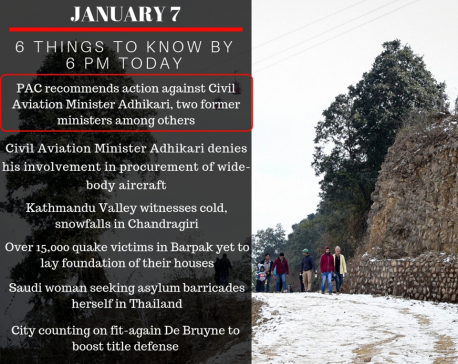
OR
Syndicates in public transport enjoy party protection: Baniya
Published On: August 18, 2016 07:03 AM NPT By: Republica | @RepublicaNepal
KATHMANDU, Aug 17: The government, the political parties, bureaucrats and the private sector often point at each other for failing to control anti-competition practices prevalent in the public transport sector.
The fact, however, is that all are equally responsible for the increase in the anti-competition practices, including syndicates, cartels and price-fixing, claims Jyoti Baniya, chairman of the Forum for Protection of Consumer Rights.
Amid all the controversy about who all are behind this anti-competition racket, the syndicates that control the transport sector continue to exact a toll on members of the general public. The alarming rise in road-accident deaths clearly shows to what extent the public is at the receiving end, Baniya said.
The government appears helpless before the transport entrepreneurs, Baniya said. Things that should be under the control of the regulatory bodies are, in practice, controlled by transport associations, he said, adding that these syndicates control all the regulatory functions, such as issuing route permits, setting quotas and fixing transport fares.
As a result, our public transport system has now become exactly what the transport associations want it to be, he claimed. “Any reform agenda ends up on the back burner.”
Baniya’s claims are supported by evidence. Consecutive governments have been unable to introduce a Commercial Driving License system. The regulatory body takes approval from the transport associations before issuing any new rules and even for bringing in new companies.
The cabinet approved new Commercial Driving License provisions two years ago but these could not be implemented due to protests from transport entrepreneurs, according to former secretary at the Ministry of Physical Infrastructure and Transport, Tulasi Prasad Sitaula.
Even creaky buses thaat are decades-old can be seen plying in various parts of country and these lack any maintenance, Baniya said. “The government cannot take any action as the transport entrepreneurs are affiliated with one or the other political party and enjoy political protection.”
The syndicate system prohibits firms from choosing their own trucking operators and pushes up costs by 25 to 30 percent, according to a report, ‘Nepal: Critical Development Constraints’ published jointly by ADB, DFID and ILO.
The Federation of Nepalese Chambers of Commerce and Industry (FNCCI), an umbrella organization of business and industry in Nepal, criticizes the transport syndicates and cartels and cites these as the reason for high cargo transportation costs. However, Baniya said, “Though the FNCCI criticizes the syndicates, the fact is transport entrepreneurs are affiliated with various district chapters of the FNCCI.”
Pashupati Murarka, president of the FNCCI, said that the federation has not given any protection to entrepreneurs who run syndicates and cartels. “Transport entrepreneurs are protected by the politicians,” he said. “The syndicates in the transport sector can be ended in a day if the government and the political leaders really want to,” he added.
The Supreme Court has already declared the practice of syndicates illegal and called on the government to clamp down on such practices.
Some anti-competition practices in public transport include barriers to new entrants, barriers to expansion, barriers to full-scale operation, and price-fixing.
You May Like This

COVID-19 in Nepal: The country fights the pandemic (VIDEO STORY)
Experts have frequently questioned the effectiveness of the months-long lockdown and criticized the government for its 'inefficiency' to tackle the... Read More...

Jan 7: 6 things to know by 6 PM today
Your daily dose of missed important news of the day. ... Read More...

Hospitals halt all OPD services except emergency
KATHMANDU, Sept 2: The Out Patient Department (OPD) services at hospitals did not operate today after the Nepal Medical Association... Read More...





Just In
- CM Kandel requests Finance Minister Pun to put Karnali province in priority in upcoming budget
- Australia reduces TR visa age limit and duration as it implements stricter regulations for foreign students
- Govt aims to surpass Rs 10 trillion GDP mark in next five years
- Govt appoints 77 Liaison Officers for mountain climbing management for spring season
- EC decides to permit public vehicles to operate freely on day of by-election
- Fugitive arrested after 26 years
- Indian Potash Ltd secures contract to bring 30,000 tons of urea within 107 days
- CAN adds four players to squad for T20 series against West Indies 'A'













Leave A Comment